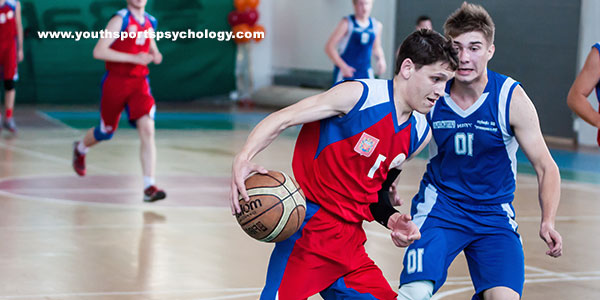
Young Athletes Who Fear Coaches’ Wrath
A young athlete writes,
“I have a new coach and before that, I was starting point guard and I was able to have confidence in myself when I played. But now I have none because I keep making mistakes due to the fact that I’m not fulfilling the new coach’s expectations.”
He continues…
“He puts so much pressure on me because if I mess up once, my whole team gets in trouble and my teammates get mad at me. I now hardly show up to practice and I think about quitting even though I’ve played my whole life.”
This young athlete is hurting his game with many mental game no-nos at once: high expectations, worries about making the coach happy, fear of embarrassment, letting down teammates and pressure to be perfect.
No wonder why the game is not fun anymore… All of these challenges are typical for athletes who have fear of failure.
First, make sure your athletes do NOT focus on meeting other’s expectations–from coaches and parents. You want them to play freely and in the flow, not afraid to make mistakes.
We suggest that they discard other’s expectations and focus on going for mini-goals, such as taking quality shots or making crisp passes.
This athlete worries about what others will think if he makes a mistake. This is becomes a problem because he’s playing to avoid mistakes for fear of embarrassment.
Athletes naturally want approval from others. But trying to make the coach and teammates happy is leading this athlete to focus on being perfect and playing with tension.
If athletes are scared of failure or that their teammates will dislike them if they make a mistake, they first need to stop making assumptions about things that may not be based in reality.
You want your athletes to focus on what they can control–their thoughts and performance. Ask them to place a bubble around the court and not think about what’s outside the bubble.
To get into the flow and have fun, you want your athletes to:
- Let go of the need to meet others’ expectations.
- Play freely without trying to be perfect to avoid mistakes.
- Focus on what they can control in the moment by moment play.
- Reconnect with why they love to play the game.
Related Articles on Youth Sports:
- How Kids Can Learn to Make the Most of Mistakes While Competing
- Addressing Anxiety, Mistakes and Low Confidence in Youth Sports
- Motivate Kids with Growth Mindset, Not Fear
*Subscribe to The Sports Psychology Podcast on iTunes
*Subscribe to The Sports Psychology Podcast on Spotify
The Composed Sports Kid

“The Composed Sports Kid” audio and workbook digital download program for young athletes and their parents or coach helps kids cope with frustration and anger in sports. Help your sports kids learn how to manage expectations and let go of mistakes so they can keep their head in the game.
The Composed Sports Kid system is really two programs in one–one program to train parents and coaches how to help their kids practice composure, and one program that teaches young athletes–ages 6 to 13–how to improve composure, let go of mistakes quickly, have more self-acceptance, and thus enjoy sports more!
